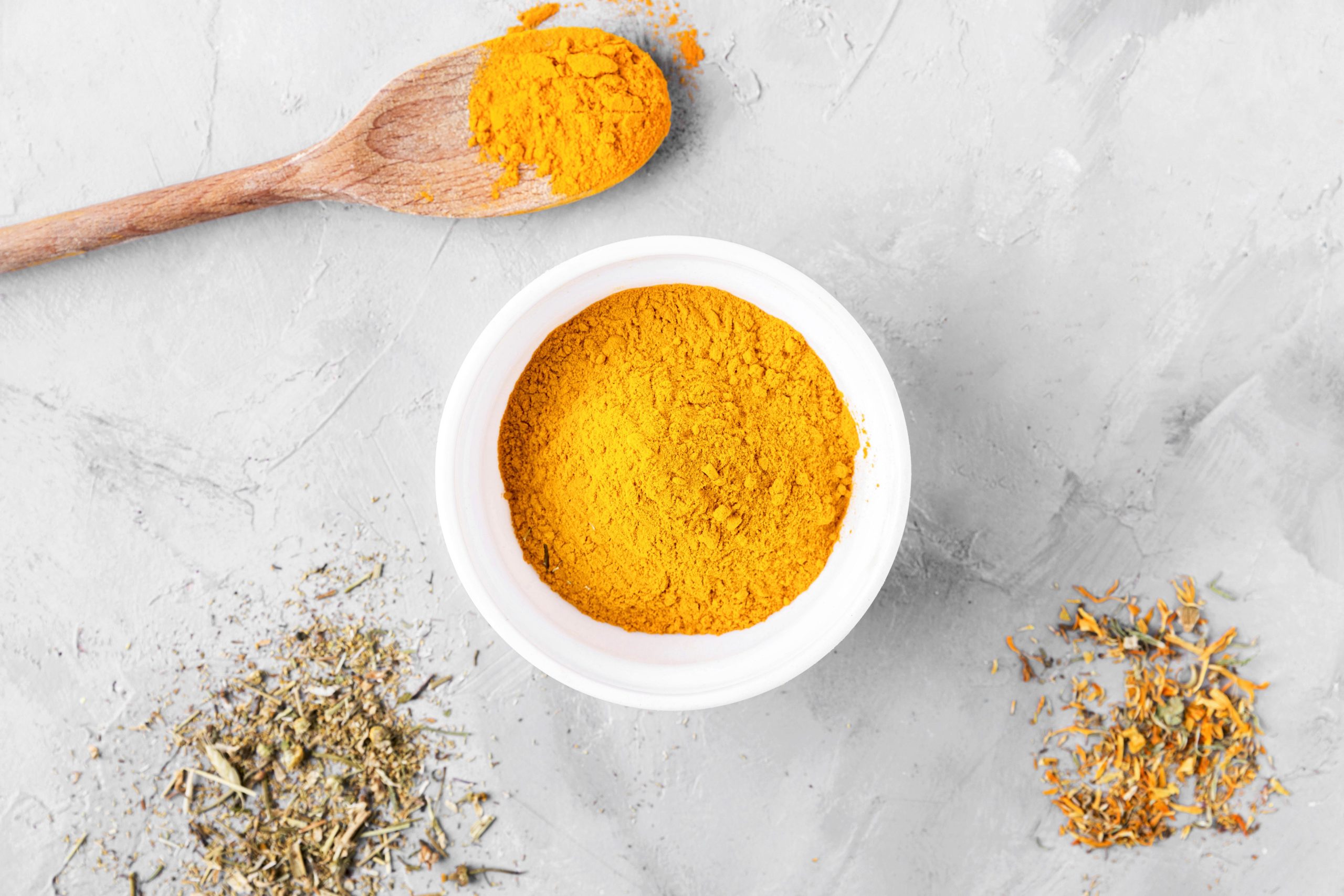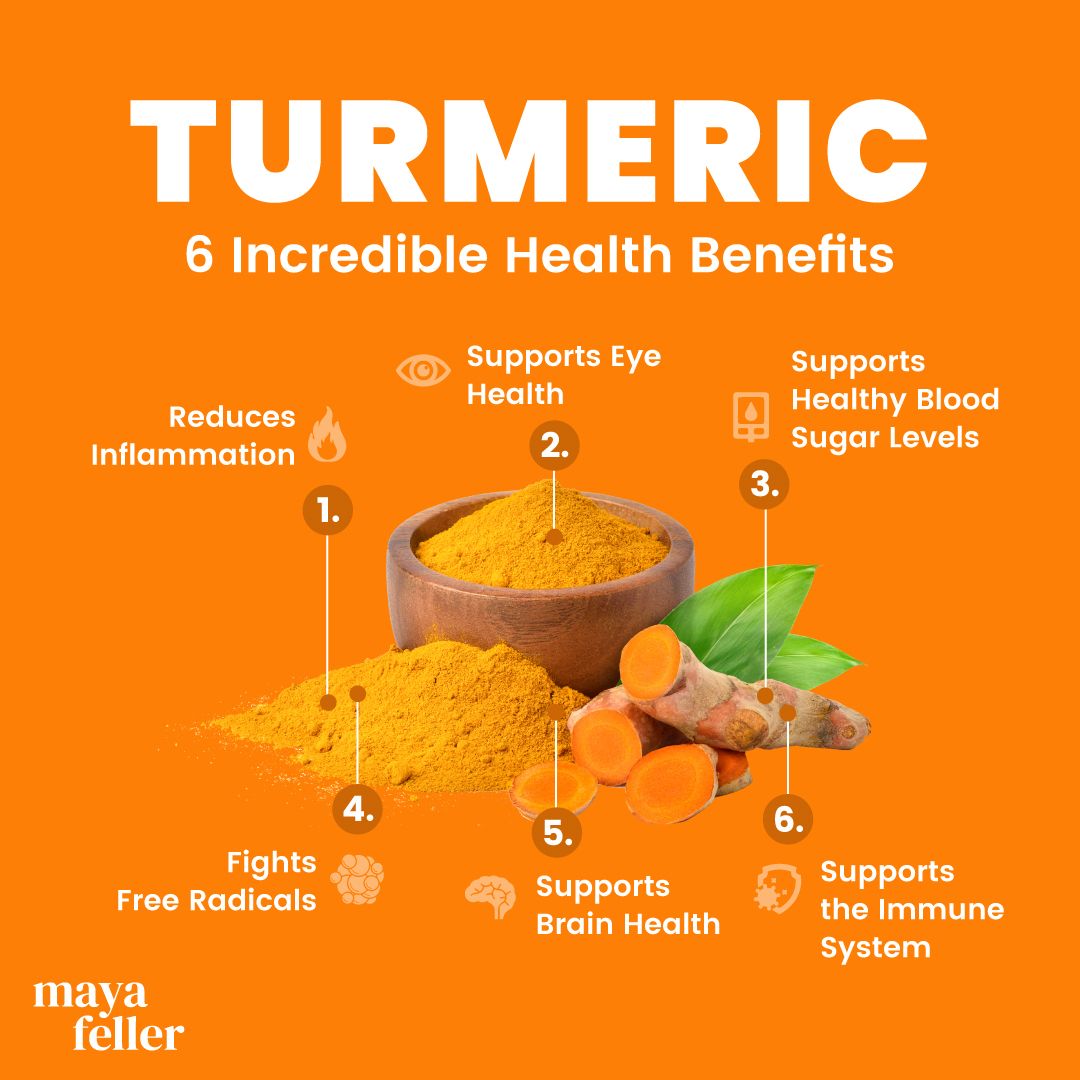Spice Feature: Turmeric + 6 Benefits & Potential Side Effects
Turmeric is a vibrant spice best known for its inclusion in curry dishes. But did you know that it contains a compound called curcumin that has been used therapeutically for centuries?
As a result of this compound, turmeric is known to support many areas of your health—from reducing inflammation to supporting your immune system and more. Keep reading to learn more about this powerful spice and all impressive benefits of turmeric.
What is Turmeric?
Turmeric is a plant native to Southeast Asia (primarily India) that is a member of the ginger family. It’s the stem of the plant that is ground up to use both as a spice and for therapeutic needs.
In the West, known as the primary ingredient in curry dishes, turmeric’s main active compound, curcumin, is what provides its yellow color and is also the source of many health benefits, largely thanks to the fact that it’s incredibly rich in antioxidants.
As a result, this spice has been used for centuries in traditional Chinese medicine practices as well as in India for many ailments, including those related to the skin, joints, respiratory system, and even digestion. [1]
In our more modern times, plenty of preliminary but promising research has shown that turmeric is still beneficial for these ailments and more.
In fact, according to a 2017 review, this spice may help to manage oxidative and inflammatory conditions such as metabolic syndrome, arthritis, anxiety, and high cholesterol. [2]
Let’s take a moment to more closely explore a few ways turmeric benefits our health.
6 Incredible Health Benefits of Turmeric
Here are six ways consuming turmeric may support your overall health.
1. Reduces inflammation
One of the most impactful turmeric benefits is its ability to quell inflammation within the body.
According to a 2015 randomized double-blind placebo-controlled study of 117 people diagnosed with metabolic syndrome, turmeric may reduce inflammation.
The researchers found that when the patients took 1 gram of curcuminoids (a family of active compounds contained within turmeric, including curcumin) combined with 10 mg of piperine each day, they experienced significantly decreased plasma levels of c-reactive protein (CRP), a major marker of inflammation. [3]
Additionally, numerous studies have found that turmeric can display powerful effects on people diagnosed with arthritis.
A 2021 study followed approximately 150 patients with knee osteoarthritis as they were administered either bioavailable turmeric extract or paracetamol (also known as acetaminophen).
The results revealed that those who took the turmeric extract experienced the following results: a 32 percent improvement in pain, a 28.5 percent improvement in stiffness, and a 20 percent improvement in function.
Additionally, 18 percent of the turmeric group reported a 50 percent or greater improvement in pain scores while 3 percent reported an astonishing 70 percent improvement. Interestingly, none of the patients in the paracetamol group met the criteria.
Finally, it’s worth noting that CRP levels in the turmeric group dropped by more than 37 percent. [4]
2. Supports eye health
Interestingly, thanks in large part to its anti-inflammatory properties, turmeric has been studied for its potential in supporting eye health.
According to a review published in 2019, turmeric has shown promising results in decreasing the inflammation associated with dry eye disease and displaying anti-bacterial activities against certain strains of bacteria associated with conjunctivitis.
The review went on to state that due to its known ability to support homeostasis in the body, it may also contain properties that may slow the development of glaucoma, cataracts, age-related macular degeneration, diabetic retinopathy, and more. [5]
3. Supports healthy blood sugar levels
Through its anti-inflammatory and antioxidant properties, turmeric may also help support healthy blood sugar levels.
A 2013 systematic review confirmed that through a series of biochemical reactions, curcumin may be effective in supporting healthy blood sugar levels as well as reducing the side effects of diabetes-related conditions, such as neuropathy, nephropathy, vascular disease, and more. [6]
More trials are required to confirm these results, but the researchers concluded by stating that “curcumin could favorably affect most of the leading aspects of diabetes, including insulin resistance, hyperglycemia, hyperlipidemia, and islet apoptosis and necrosis.”
4. Fights free radicals
Because it’s a rich source of antioxidants, the curcumin in turmeric has also shown promise in fighting free radicals.
As you may be aware, antioxidants are known to fight free radicals, which cause oxidative stress that can lead to chronic illness and even accelerated aging.
According to a 2020 meta-analysis of clinical trials on the antioxidant potential of curcumin, when 308 participants supplemented with curcumin for an average of 67 days, they experienced significant increases in their total antioxidant capacity and decreases in a marker known to be linked to harmful LDL levels. [7]
5. Supports brain health
Let’s discuss brain health for a moment.
Research has shown that a reduction in a protein known as brain-derived neurotrophic factor (BDNF) negatively impacts cognitive function along with the ability to learn and even memory recall. A reduction in BDNF also been linked to behavioral disorders.
While psychological distress has been known to cause decreases in BDNF, fortunately a 2019 meta-analysis confirmed that there may be hope in raising your amount of BDNF. [8]
According to the meta-analysis, which covered four randomized control trials with 139 participants, supplementing with curcumin for at least eight weeks significantly increased serum BDNF levels. [9]
Meanwhile, this powerful compound in turmeric has been shown to display other brain-supporting benefits as well.
According to a study published in 2017, 123 people with major depressive disorder were divided into one of four groups: taking a placebo, low-dose curcumin extract (250 mg), high-dose curcumin extract (500 mg), or combined low-dose curcumin extract and saffron (15 m) for a period of 12 weeks.
The findings revealed that all groups, except the placebo group, significantly improved depressive symptoms and anxiety scores.
Additionally, those diagnosed with atypical depression who were taking either the curcumin or curcumin-saffron combination experienced greater efficacy compared to the other patients (with response rates of 65 percent versus 35). [10]
Interestingly, the researchers didn’t find any differences between the doses or with the inclusion of saffron. As a result, they surmised that curcumin could provide anxiety-reducing effects in people diagnosed with major depressive disorder.
6. Supports the immune system
Believe it or not, turmeric is also known to contain anti-microbial properties and, as a result, has been studied for its ability to support immune system health.
While more research is required to establish beneficial formulations, a 2020 analysis found that curcumin had the possibility of inhibiting the replication of many viruses through its many actions, including its anti-inflammatory, antioxidant, and NF-kB signaling properties. [11]
Side Effects of Turmeric
While turmeric typically doesn’t cause side effects when consumed in moderate amounts, everybody is different and may react accordingly. Therefore, should you choose to supplement with turmeric or eat very large amounts of it, you may experience stomach upset, nausea, dizziness, or diarrhea.
How to Get More Turmeric
If you’re looking to include more turmeric into your pattern of eating, I recommend starting with some delicious recipes. Give my Skillet Turmeric Chicken and Rice Recipe or this Carrot Ginger Turmeric Soup with Lime a try.
There are also turmeric supplements on the market, but I recommend speaking with your physician or working with a Registered Dietician first.



Leave a Reply